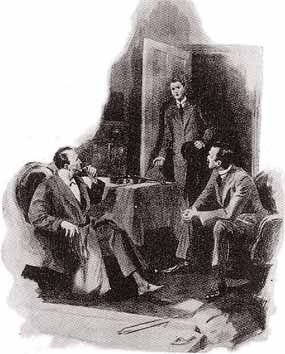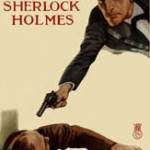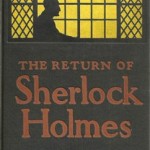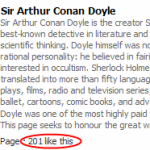Mr. Sherlock Holmes was always of opinion that I should publish the singular facts connected with Professor Presbury, if only to dispel once for all the ugly rumours which some twenty years ago agitated the university and were echoed in the learned societies of London. There were, however, certain obstacles in the way, and the true history of this curious case remained entombed in the tin box which contains so many records of my friend’s adventures. Now we have at last obtained permission to ventilate the facts which formed one of the very last cases handled by Holmes before his retirement from practice. Even now a certain reticence and discretion have to be observed in laying the matter before the public.
It was one Sunday evening early in September of the year 1903 that I received one of Holmes’s laconic messages:
Come at once if convenient–if inconvenient come all the same. S.H.
The relations between us in those latter days were peculiar. He was a man of habits, narrow and concentrated habits, and I had become one of them. As an institution I was like the violin, the shag tobacco, the old black pipe, the index books, and others perhaps less excusable. When it was a case of active work and a comrade was needed upon whose nerve he could place some reliance, my role was obvious. But apart from this I had uses. I was a whetstone for his mind. I stimulated him. He liked to think aloud in my presence. His remarks could hardly be said to be made to me–many of them would have been as appropriately addressed to his bedstead–but none the less, having formed the habit, it had become in some way helpful that I should register and interject. If I irritated him by a certain methodical slowness in my mentality, that irritation served only to make his own flame-like intuitions and impressions flash up the more vividly and swiftly. Such was my humble role in our alliance.
When I arrived at Baker Street I found him huddled up in his armchair with updrawn knees, his pipe in his mouth and his brow furrowed with thought. It was clear that he was in the throes of some vexatious problem. With a wave of his hand he indicated my old armchair, but otherwise for half an hour he gave no sign that he was aware of my presence. Then with a start he seemed to come from his reverie, and with his usual whimsical smile he greeted me back to what had once been my home.
“You will excuse a certain abstraction of mind, my dear Watson,” said he. “Some curious facts have been submitted to me within the last twenty-four hours, and they in turn have given rise to some speculations of a more general character. I have serious thoughts of writing a small monograph upon the uses of dogs in the work of the detective.”
“But surely, Holmes, this has been explored,” said I. “Bloodhounds– sleuth-hounds–”
“No, no, Watson, that side of the matter is, of course, obvious. But there is another which is far more subtle. You may recollect that in the case which you, in your sensational way, coupled with the Copper Beeches, I was able, by watching the mind of the child, to form a deduction as to the criminal habits of the very smug and respectable father.”
“Yes, I remember it well.”
“My line of thoughts about dogs is analogous. A dog reflects the family life. Whoever saw a frisky dog in a gloomy family, or a sad dog in a happy one? Snarling people have snarling dogs, dangerous people have dangerous ones. And their passing moods may reflect the passing moods of others.”
I shook my head. “Surely, Holmes, this is a little far-fetched,” said I.
He had refilled his pipe and resumed his seat, taking no notice of my comment.
“The practical application of what I have said is very close to the problem which I am investigating. It is a tangled skein, you understand. and I am looking for a loose end. One possible loose end lies in the question: Why does Professor Presbury’s wolfhound, Roy, endeavour to bite him?”
I sank back in my chair in some disappointment. Was it for so trivial a question as this that I had been summoned from my work? Holmes glanced across at me.
“The same old Watson!” said he. “You never learn that the gravest issues may depend upon the smallest things. But is it not on the face of it strange that a staid, elderly philosopher–you’ve heard of Presbury, of course, the famous Camford physiologist?–that such a man, whose friend has been his devoted wolfhound, should now have been twice attacked by his own dog? What do you make of it?”
“The dog is ill.”
“Well, that has to be considered. But he attacks no one else, nor does he apparently molest his master, save on very special occasions. Curious, Watson–very curious. But young Mr. Bennett is before his time if that is his ring. I had hoped to have a longer chat with you before he came.”
There was a quick step on the stairs, a sharp tap at the door and a moment later the new client presented himself. He was a tall, handsome youth about thirty, well dressed and elegant, but with something in his bearing which suggested the shyness of the student rather than the self-possession of the man of the world. He shook hands with Holmes, and then looked with some surprise at me.






